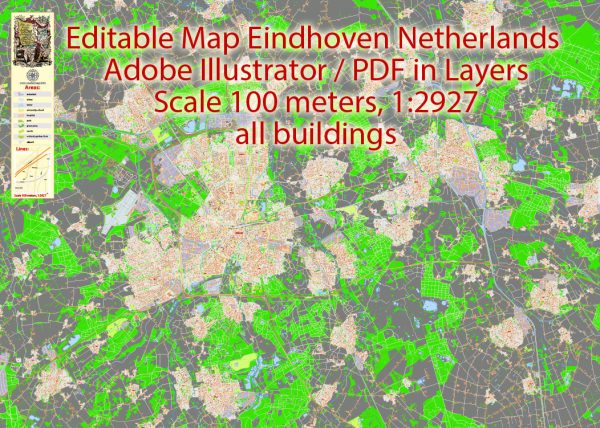Eindhoven, located in the southern part of the Netherlands, has a rich history of urban development that has transformed it from a small town into a thriving modern city. Here’s a brief overview of key historical milestones in Eindhoven’s urban development:
- Early History:
- Eindhoven’s history dates back to the 13th century when it was originally a small town centered around the confluence of the Dommel and Gender rivers.
- The town initially developed around a fortified castle built by Henry I, Duke of Brabant.
- Industrial Revolution and Philips Era:
- The late 19th century brought significant changes with the onset of the Industrial Revolution. Eindhoven’s transformation into an industrial hub began when Gerard Philips and his father Frederik founded the Philips Company in 1891.
- The establishment of Philips had a profound impact on the city, leading to rapid industrialization and urbanization. The company became a major employer, attracting a growing population.
- World War II:
- Eindhoven suffered significant damage during World War II. In September 1944, during Operation Market Garden, the city was liberated by the Allied forces. The liberation had a profound impact on the city’s development and is commemorated annually.
- Post-War Reconstruction:
- The post-war period saw extensive reconstruction efforts to rebuild the city. This included the construction of new residential areas, infrastructure, and the expansion of industrial zones.
- Technological Hub:
- Eindhoven’s status as a technological and innovation hub solidified in the latter half of the 20th century. The city became known as the “Brainport” region, hosting numerous high-tech industries and research institutions.
- The High Tech Campus Eindhoven, home to various technology companies, further contributed to the city’s reputation as a center for innovation.
- Cultural Development:
- Eindhoven has also experienced cultural development, with the establishment of various museums, galleries, and cultural events. The Van Abbemuseum, for example, is a renowned modern art museum in the city.
- Modern Urban Planning:
- In recent decades, Eindhoven has undergone modern urban planning initiatives. The city center has been revitalized, with new architectural developments, public spaces, and amenities.
- Sustainable urban development has become a focus, with efforts to create green spaces and promote environmentally friendly initiatives.
- Knowledge and Design Hub:
- Eindhoven has evolved into a center for knowledge and design. The city hosts the Design Academy Eindhoven and the Eindhoven University of Technology, contributing to its reputation as a hub for creative industries and technological innovation.
In summary, Eindhoven’s urban development is characterized by its transition from a historic town to an industrial powerhouse during the Philips era, followed by post-war reconstruction, technological advancements, and a contemporary focus on sustainability, innovation, and design.


 Author: Kirill Shrayber, Ph.D. FRGS
Author: Kirill Shrayber, Ph.D. FRGS